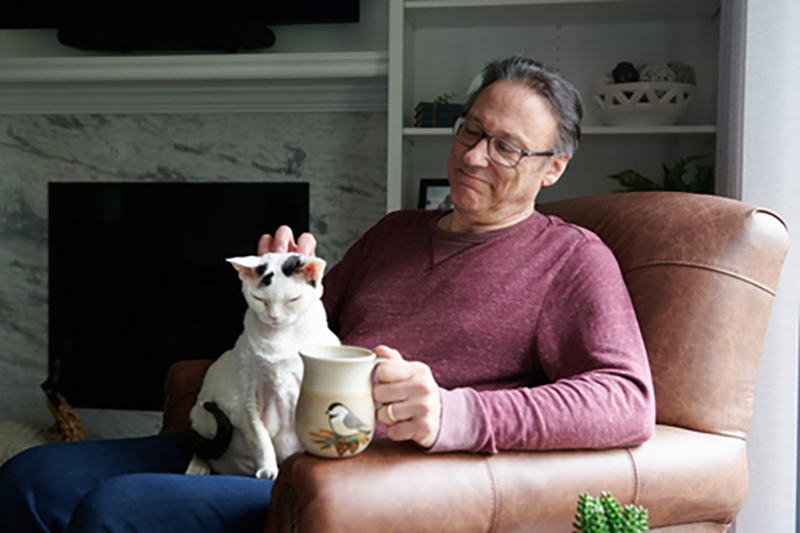“Tony, you’re having a stroke!"
A mini stroke, followed by a larger stroke. But with prompt and expert care, life is returning to normal

When Rochester Hills resident Tony Caporale woke up at around 4:30 a.m. on January 14, 2023, to wish his wife a good day at work, he initially wasn’t sure if it was a dream or what many might describe as the beginning of a nightmare.
“I remember trying to say to my wife, Sue, ‘have a good day,’ but the words weren’t coming out,” he said. “Weird stuff started happening, like my hand started moving. When I tried to talk and the words were gibberish, my wife said ‘Tony, you’re having a stroke!’”
Tony’s wife, a nurse, comes to the rescue
Sue, a nurse at a local hospital, immediately called 911. By the time the ambulance came to the house, his symptoms had subsided. Tony, who is 62 years old with no known previous health issues, was taken to a local hospital where tests determined his left carotid artery was blocked. The symptoms he was experiencing were a result of a transient ischemic attack (TIA), often called a “mini stroke,” a temporary shortage of blood flow to the brain. It is estimated that about 1 in 3 people who have a TIA will eventually have a stroke.
At the local hospital, his wife suggested that he be transferred to Henry Ford Hospital, a Comprehensive Stroke Center, for further evaluation and treatment.
Stroke detected during monitoring at Henry Ford
 As Tony was being closely monitored at Henry Ford Hospital in the Stroke Unit, the next morning at 2:30 a.m. he again was unable to speak or say the right words. He was having a stroke and the team was immediately alerted.
As Tony was being closely monitored at Henry Ford Hospital in the Stroke Unit, the next morning at 2:30 a.m. he again was unable to speak or say the right words. He was having a stroke and the team was immediately alerted.
Endovascular surgical treatment was promptly performed by Alex Chebl, M.D., director, Henry Ford Comprehensive Stroke Center and director, Division of Vascular Neurology.
Dr. Chebl explains Tony had carotid artery dissection, a condition where the layers of the carotid artery are spontaneously separated. This can compromise blood flow to certain areas of the brain and can lead to a stroke.
He said in terms of recovery, Tony was fortunate.
“Most patients who have this kind of stroke don’t recover as well as he has,” Dr. Chebl said. “Time is of the essence. The sooner you come to the hospital, the more likely we are able to rescue as much brain tissue as possible.”
He adds that major advances in stroke care have made it possible to provide prompt treatment and restore normal blood flow in seconds.
“The good news is we are helping more and more patients, even those with big strokes, to minimize brain damage or death.”
Tony was in the hospital for five days as part of his monitoring and recovery.
“I was asked several questions to make sure I could say things like my name. It took a few days to get the wits about me back.”
Tony said his speech came back but he did experience a few effects from his stroke including numbness in his right thumb and two fingers as well as some vision loss on his left eye caused by a blood clot in his retina.
“The bad news is the vision will not return but the good news is with both eyes open, I can see about the same as before the stroke.” To help him regain mobility in his right hand, Tony underwent occupational therapy for a few weeks to help him with everyday activities like writing, picking up a fork and brushing his teeth.
Happy to be alive and back at work
 With successful surgery and rehabilitation at Henry Ford, Tony, an accounting manager at Health Alliance Plan, has returned to work and is thankful that his life is mostly back to normal.
With successful surgery and rehabilitation at Henry Ford, Tony, an accounting manager at Health Alliance Plan, has returned to work and is thankful that his life is mostly back to normal.
“Between my wife, the night nurse at Henry Ford and Dr. Chebl, they saved my life,” Tony said. “I appreciate sharing this story because I know how debilitating a stroke can be. Thanks to their fast action and treatment, I am not only alive today but I can still work, continue my physical activities like golf and basically live a normal life.”
.svg?iar=0&hash=F6049510E33E4E6D8196C26CCC0A64A4)

/hfh-logo-main--white.svg?iar=0&hash=ED491CBFADFB7670FAE94559C98D7798)